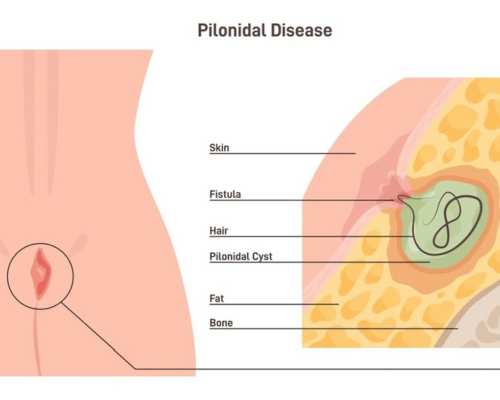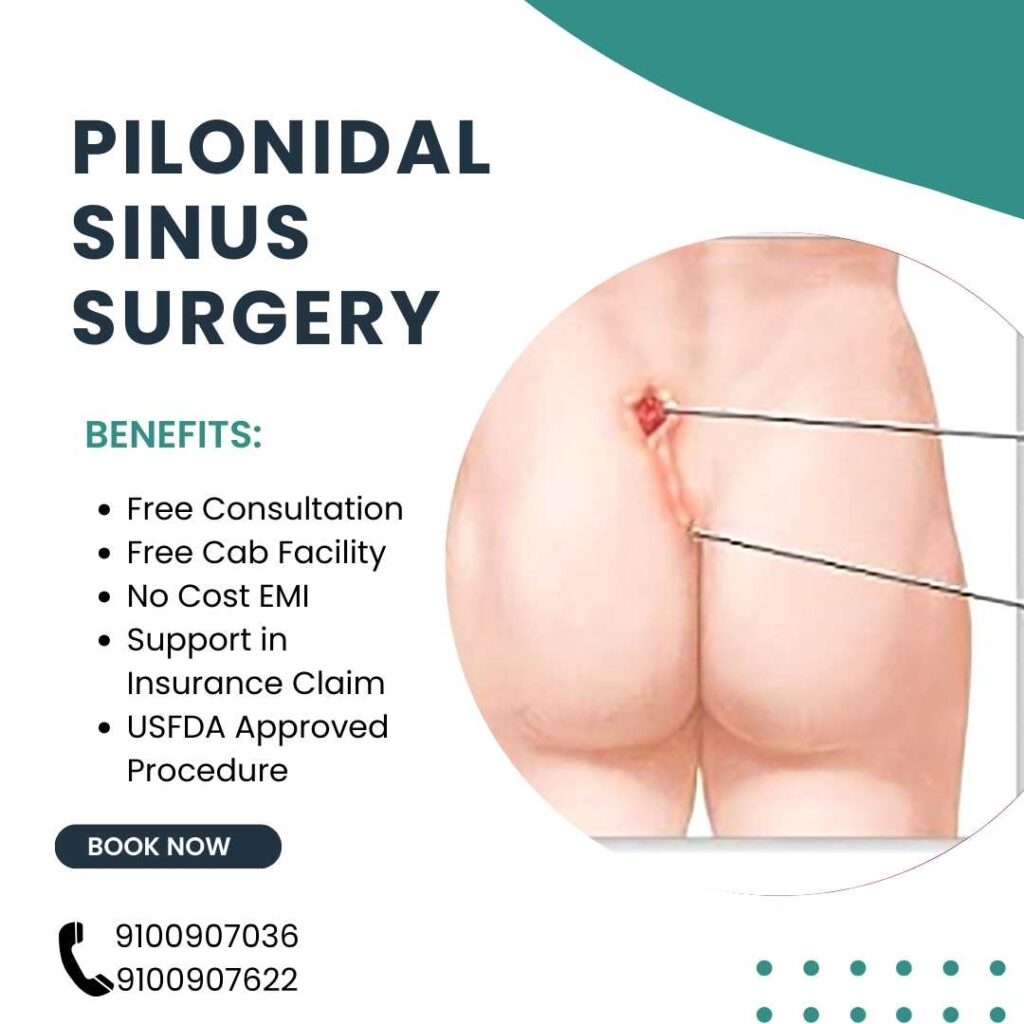Pilonidal Sinus Surgery
Do you have a minor discharge-producing defect in the skin of your buttock? It could be a pilonidal sinus. The pilonidal sinus is a small tract that exists following a previous infection in the area. It can be a dry tract, get infected again, and actively secrete discharge. This can be very cumbersome and, therefore, is best treated with a pilonidal sinus surgery. Get your Pilonidal Sinus Surgery removed by the best surgeons through Medintu for pilonidal tract removal surgery. Book your appointment today!
Fill out form to enquire now
What is a pilonidal sinus?
A pilonidal sinus, pilonidal cyst, or sacrococcygeal fistula is a small tract or tunnel that forms on the skin over the cleft of the buttocks. The sinus usually has hair, skin, and other foreign matter as its content and is a common condition in men more than women. It is an easily treatable condition and can be done with the help of a pilonidal tract or cyst excision surgery. An experienced general surgeon will be the doctor to consult in this condition.
What are the complications of pilonidal surgery?
Complications of Pilonidal Surgery:
1.Excess bleeding during surgery.
2.Injury to surrounding nerves or vessels.
3.Infection of the surgical wound.
4.Numbness in the area of surgery.
5.Pain or discomfort following the surgery.
6.Allergic reactions to anesthesia.
7.Bleeding during the surgery.
8.Excessive scarring at the site of surgery.
How can pilonidal cysts be treated?
Once a pilonidal sinus is diagnosed after clinical examination and history taking, treatment can be started. A pilonidal cyst, if minor and not that severe, can be managed with the following:
1.Antibiotic tablets and creams to apply locally to cure folliculitis.
Sitz bath in which you soak the affected area in warm water.
2.Hair removal via forceps is necessary in case of ingrown hair, and the area should be kept hair-free to avoid pilonidal sinus formation.
3.Incision and drainage of the cyst if it becomes big and starts collecting pus.
4.Finally, surgical excision of the tract becomes necessary if there is a persistent cyst with recurring infection.
Procedure for a Plonidal Tract Surgery:
Once the decision for surgery is made, blood tests are done, an MRI of the hip and pelvis region is taken, an anesthetic checkup is done, and the patient is taken in for surgery. The following are some of the procedures used for pilonidal removal surgery:
- Incision and drainage to remove any abscess formed due to the duct infection.
- Excision with primary closure is another simple procedure in which the entire duct is removed, and the wound is closed with stitches.
- If the tract is extensive, the lot is sometimes excised, and a skin flap is placed to close the surgical wound.
- In the procedure of wide excision with available healing, the skin flap may not be placed and left open after excision.
- In the cleft lift procedure, edges are lifted to close the defect to prevent the cyst from recurring.
- Endoscopic pilonidal treatment using an endoscope is also a minimally invasive surgery for pilonidal sinus treatment. Once the surgery is over, the patient lies in the observation room for a few hours before being shifted to the ward and later discharged.
Causes of the formation of a pilonidal Cyst:
Below are some of the causes of pilonidal cysts:
- Irritation due to hair follicles that may happen because of friction with uncomfortable clothing or even movement
- Ingrown hairs after shaving or waxing the area can irritate the follicles and cause infections.
- Prolonged pressure in the area of the buttock cleft due to long hours of sitting or any trauma to the coccyx area.
- Congenital conditions like deep natal clefts.
- Obesity can also increase the pressure at the buttock cleft area.
- Poor hygiene, such as not taking frequent baths or not changing underwear, can also lead to pilonidal sinus.
- During puberty and other periods of hormonal imbalance, excessive sweating may occur, which might clog the hair follicles and cause cysts.
How do you recover from pilonidal surgery?
You can take the following tips to recover from a pilonidal surgery:
- Keep the site of surgery clean and dry.
- Take medicines on time as prescribed by the doctor
- Apply hygienic practices to prevent further recurrence
- Go for regular follow-ups and reviews with the doctor.
- Eat nutritious and healthy food.
- Keep up the basic level of physical activities.
- Wear airy and comfortable scores.
Why Choose Medintu?
Medintu is a leading site for home-based healthcare where you can get all your healthcare needs in one place at an affordable cost and within the comfort of your home.
With Medintu, you can access world-class doctors and surgeons for the best outcomes in minimally invasive pilonidal surgery. Our surgeons are trained to give the best results with every procedure for pilonidal tract surgery, giving almost zero recurrence. Book your appointment today to get operated on by skilled general surgeons using state-of-the-art technology for pilonidal surgery.

FAQs
What is the duration of pilonidal surgery?
A pilonidal surgery can last anywhere from 1-2 hours as it is a minor surgery that can be done as a daycare procedure as well.
How long does it take to recover from a pilonidal surgery?
Recover from a pilonidal surgery can take 1-2 weeks for complete recovery, but you will be able to resume most normal activities within the first week of the surgery.
What are the chances of recurrence of pilonidal cysts?
Even after surgery, there can be chances of cyst recurrence in other areas if proper hygiene is not maintained and other factors that caused the cyst in the first place continue to persist.
What is the pilonidal surgery cost?
The pilonidal surgery cost can range from 10,000 to 30,000 rupees, depending on the type of procedure, the location of the surgery, the doctor, and the city.

